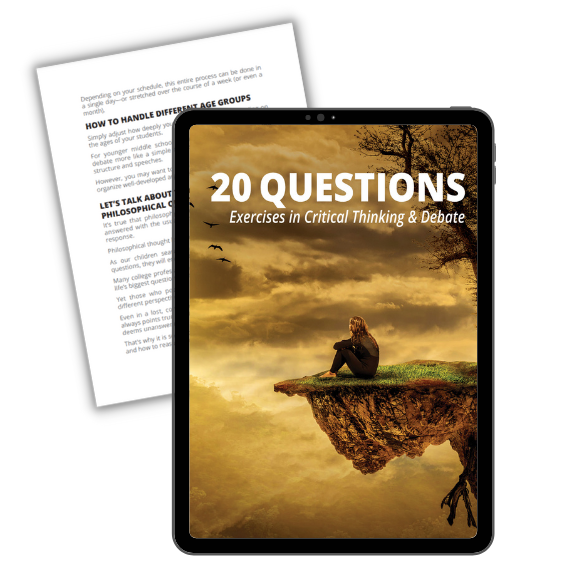Many people use the terms logical thinking and critical thinking interchangeably; however, there are subtle differences between the two.
On the one hand, logical thinking is pretty straightforward.
It’s a method of thinking that uses logic or analysis of information to evaluate a situation.
Critical thinking, on the other hand, is a process that utilizes logical thinking but takes it a step further.
To think critically is to question the face value, connect the dots, and seek the truth.
Get a Question-Based Critical Thinking Exercise—Free!
Introduce critical thinking gently & easily with thought-provoking exercises.
What Is Logical Thinking?
Logical thinking involves thinking in a disciplined manner. Everyday we come across situations where we need to determine what is going on and why.
The process may be as simple as evaluating product information or as complex as embracing (or not) an opportunity that requires a significant life change.
You probably don’t toss a coin in the air to make important life decisions. Instead, you analyze the facts and use reason to help you make good choices.
Let’s look at the example of a job opportunity in another state.
It might sound like a fantastic career move, but applying a big of logical thinking before you take the leap can mean the difference between a positive outcome and one you’ll regret.
- What will it cost you to move?
- Is the cost of living higher in the new city than where you currently live?
- What is the crime rate like?
- Is the city governed well?
- What about increased time commitment? Work load?
Observing and analyzing all the facts and scenarios can help you come to a well reasoned conclusion—and that is logical thinking in a nutshell.
What Is Critical Thinking?
Critical thinking is closely related to logical thinking. It involves the questioning of data, beliefs, and information to make a reasoned conclusion or decision.
It’s the ability to take various ideas or pieces of information and make connections between them.

Using the example above, if you were offered a great job opportunity in another city, you still consider all the same factors previously mentioned.
However, with critical thinking, you move beyond hard facts and ask things like:
- How do your kids feel about changing schools?
- Do the opportunities offered outweigh the disadvantages?
- Why would the new job be better than what you have now?
Let me put it another way by posing another question:
Do you take whatever you’re presented with and assume that it is just so? Precisely as described and portrayed?
Likewise, that new career may look good on paper, but what about the invisible factors that go beyond the facts and figures in your contract?
Seeking truthful answers to those not-so-black-and-white questions is the definition of critical thinking.
Logical Reasoning vs Critical Thinking: The Relationship Between the Two
As touched on earlier, logical reasoning involves assessing facts to arrive at a valid conclusion.
With no assumptions being made and emotions removed from the equation, the principles of logic can be used much like you would use a math formula to solve a problem.
There’s a clear distinction between right and wrong.
In theory, given the same situation with the exact same information, two different people would arrive at the same conclusion.
On the other hand, critical thinking involves questioning the answers and information you get.
For instance, you might investigate if the person providing the information has a vested interest in a particular outcome and how that influences the information provided.
You may also ask yourself if you’re missing information or how reliable your source is.
There’s definitely a blurred line between logical reasoning and critical thinking, but the connection is this:
Logical thought processes involve critical thinking, and using critical thinking skills involves a bit of logic.
Is Questioning and Reasoning the Same Thing?
Reasoning involves the use of both deductive and inductive processes to reach a conclusion.
“Deductive” is just a fancy word for following a fact (or idea, statement, and so on) to its logical conclusion.
“Inductive” reasoning provides room for one’s own experiences and observations along the pathway to a conclusion.
In short, to reason is to use logical thinking to evaluate and determine then explain your approach to a problem.
Questioning, on the other hand, is different than—though part of—reaching a reasoned conclusion.
Questions help you dig up more information so you can reason effectively to determine the truth of a matter.
So essentially, questioning is just one part of reasoning. They are not one in the same.
How to Strengthen Your Critical Thinking Skills
When a situation calls for forming your own opinion or making a decision, it’s important to know how to think as opposed to being told what to think.
It’s all too easy to be swayed by popular opinion.
That being the case, it’s important to pause amid the clamor and think both logically and critically to ensure you know exactly what you believe instead of simply following the crowd.
Doing so also equips you to make choices based on your personal values, beliefs, and goals.
You can strengthen your critical thinking skills by thinking through situations, one step at a time.
You’ll gain knowledge as you gain real-world experience, but that database of knowledge isn’t going to serve up a solution for every problem you face.
That’s where the ability to think critically becomes so important.
Practice asking questions while questioning assumptions.
(Here’s a list of fun critical thinking questions that are more lighthearted if you need help getting started.)
Pay attention to the processes you use to analyze information and reach conclusions.
Take time to break down any barriers to critical thinking that may exist.
Today, we are spoon-fed so much information on social media and the internet that thinking sometimes seems irrelevant, but oh what a dangerous path that is.
If you don’t already, begin questioning the things you read and hear.
Do your own research.
Question commonly accepted facts.
Analyze the information you receive and from whose mouth you receive it from.
Of course, not every little situation requires an in-depth analysis or use of critical thinking skills.
Family and friends won’t appreciate being questioned about everything they say or do.
Still, judicial use of logical thinking and critical thinking skills can help you become more informed about what is true and what is not.
If you want to help your teen sharpen those skills, check out our award-winning curriculum, Philosophy Adventure.


